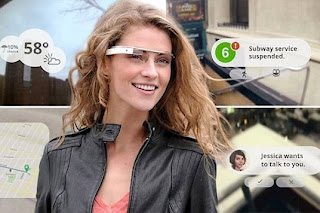How is the future of the way we use search changing?
 Mobile technology is already having a major effect on the way we use search and it’s constantly evolving. Take Google for example: not content with providing us with an online search engine format, they’re planning the release of Google Glass that will allow users to get information instantly about the things they want, without even having to search for it.
Mobile technology is already having a major effect on the way we use search and it’s constantly evolving. Take Google for example: not content with providing us with an online search engine format, they’re planning the release of Google Glass that will allow users to get information instantly about the things they want, without even having to search for it.But with the rate of change should we be concerned that the information we view as personal is being used to profile us and filter what we see?
The future of search could have more of an impact on us than we think – here’s our guide to what it has in store for us.
In the beginning . . .
Google wasn’t the first way to search the internet but the company had a clever idea. When you search for something, say a new car, Google sends its web spiders crawling through internet search listings, counts how many popular and trusted websites have linked to each result, puts them in order and lists the best matches.
 Google sells huge amounts of advertising space around searches, which generates a considerable amount of revenue. This enabled them to purchase sites like YouTube to learn more about what we like. And it made ads more relevant because Google could take our online behaviour into account when displaying ads they think we’ll like.
Google sells huge amounts of advertising space around searches, which generates a considerable amount of revenue. This enabled them to purchase sites like YouTube to learn more about what we like. And it made ads more relevant because Google could take our online behaviour into account when displaying ads they think we’ll like.A sophisticated future
So how is search developing and becoming more sophisticated?
Well, Symantec search will be a key part of that. It looks at the meaning of each of the words you search for, next to each other and works out how they relate and what search results correspond and fit best.
Then there’s the importance of social. Everybody’s tweeting and liking more than ever but how will that affect your search results?
Social search is a type of web search that graphs your behaviour on social networking sites instead of using algorithmic approaches to search relevance. It considers what you and your friends have ‘touched’ on social sites: tags, ratings and rankings, comments, bookmarks, news, images, videos, music, podcasts and prioritises these for you.
Then we get to mobile: touch screens and soft-key virtual keyboards mean it can be a bit of a pain to search for things on the move. Voice search means you can ask your phone for a recommendation, like where the nearest taxi service is or what is the quickest train route. Instead of a standard list of results, a search engine works out all the things you need and presents them on one page, saving the user time and effort clicking on unrelated content.
But what if you didn’t have to search at all? You could just put on your Google Glasses and technology like GPS navigation and facial recognition could display all of the information about everything you’re looking at without even having to ask for it. Facebook profiles, Twitter feeds, maps, timetables, menus – they would all pop up in front of your eyes with just the turn of your head.
This all sounds hugely exciting but shouldn’t we be a bit concerned?
Do we really want everything we do recorded forever? And what happens if that information gets into the wrong hands? Do we really want details of all our personal actions available to our friends, our enemies or our potential employers?
And is there a problem with search engines filtering out what we don’t know yet? Will we ever be able to just stumble upon something again?
How will we get the full picture?
The future of search could have more of an effect on us than we think – let us know what you think!
Follow the story on Twitter @LearnersCloud
Author
LearnersCloud is an easy-to-integrate e-learning system that helps GCSE students get to grips with all of the key topics and concepts, at their own pace.
Covering GCSE Maths, English, Chemistry, Physics and Biology, students can learn, revise and test themselves on their PC, tablet and smart phone device anywhere and at any time.
Our GCSE tutorials are quality assured and proven to accelerate learning for students of all abilities, and offer an ideal resource for GCSE revision.
